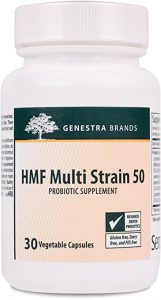Feeling bloated after meals usually means you’re having trouble digesting the foods you’re eating. As your body is struggling to breakdown and access the nutrients from the large bolus of food sitting in your gut.
In most cases, this stems from low stomach acid (hypochlorhydria) and/or an inadequate secretion of digestive enzymes. A diagnosis that is more common than you think; with some functional medicine experts suggest it may be affecting nearly 50% of the North American population.
Step 1 – Try the Digestion (HCL) Test
If after assessing yourself with the digestion test and supplementing with the appropriate number of capsules you’re still feeling bloated, it likely has something to do with your gut health. Fortunately, we’ve already eliminated the foods causing gut damage, and stopped fueling the growth of bad bacteria by drastically lowering our daily sugar intake. However, this doesn’t mean your gastrointestinal lining is repaired, and doesn’t mean you have a favorable ratio of good:bad gut flora.
Step 2 – Supplement a Probiotic
A probiotic introduces healthy bacteria to your gut, in hopes of outnumbering any of the bad stuff that’s built-up over time. Obviously focusing on getting rid of the harmful bacteria would be ideal, but this isn’t going to happen overnight. We need to heal your gut now by introducing some of the good stuff, and the Live It NOT Diet! plan will continue to do it’s part to take care of the rest (1, 2).
Unfortunately, a damaged gut can sometimes give us the impression that we’re allergic to a food that’s actually not harmful. Causing intolerance tests to produce results showing negative results with foods like chicken, spinach, and beef…and making things extremely confusing/frustrating.
This is one of the reasons addressing digestion and healing your gut should come before any testing. Plus, it will save you a lot of unnecessary time and money.
If after a few months of Step 1 & 2, you’re still feeling ‘bloated after meals,’ I’d recommend experimenting with a few weeks of ZERO wheat. Yes, even on Feast Days.
Step 3 – Implement the Wheat-Free Feast
Sleeping better and stressing less will also improve your gut health, as it prevents cortisol from messing with digestion and inflicting any additional gut damage. So, make sure that’s a priority.
Stay Lean!
Coach Mike
RELATED ARTICLES:
Test Your Digestion (The HCL Test)
Live It NOT Diet! FAQs - Low Energy?
Zonulin - Connecting Wheat & Leaky Gut

